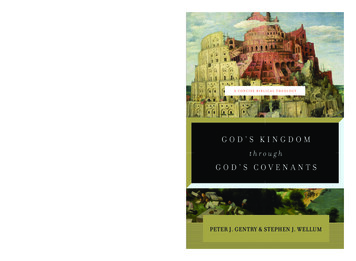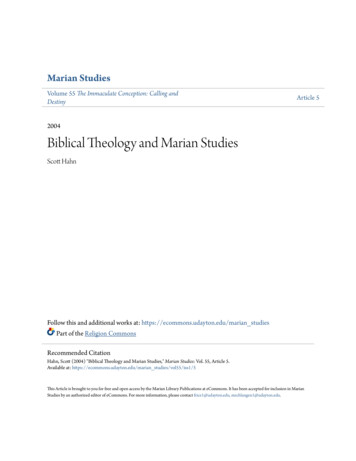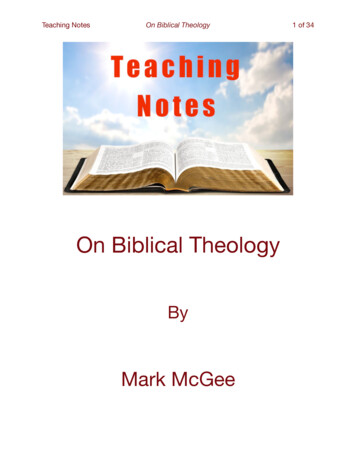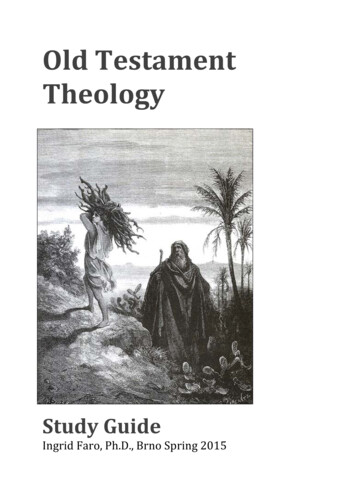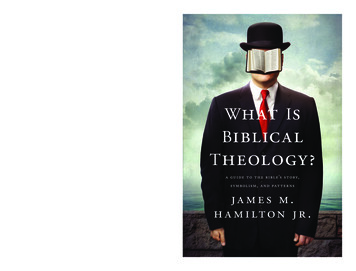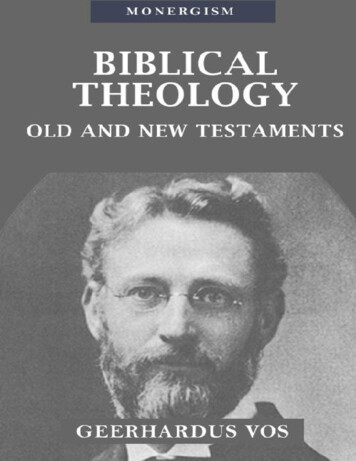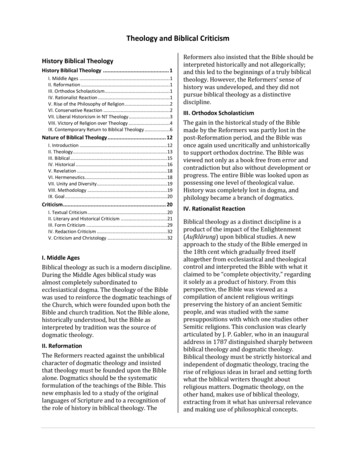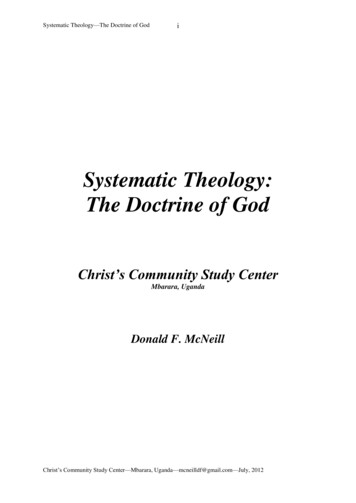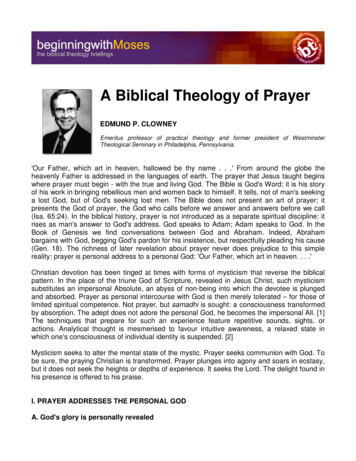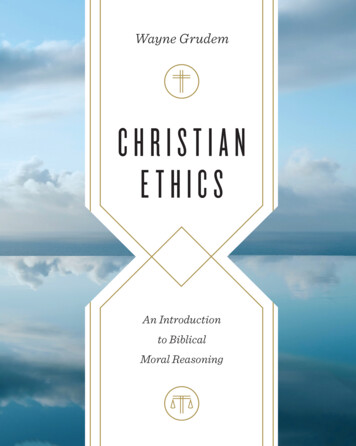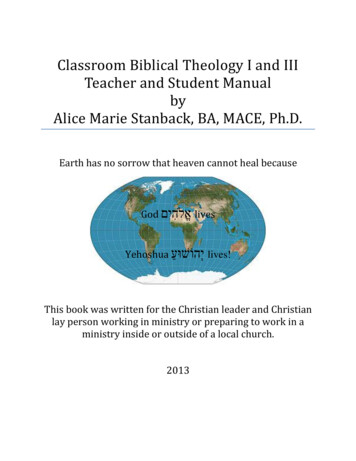
Transcription
Classroom Biblical Theology I and IIITeacher and Student ManualbyAlice Marie Stanback, BA, MACE, Ph.D.Earth has no sorrow that heaven cannot heal becauseGodlivesYehoshualives!This book was written for the Christian leader and Christianlay person working in ministry or preparing to work in aministry inside or outside of a local church.2013
Copyright 20013 by Alice Stanback, Ph.D. All rights reserved.No part of this work may be reproduced, duplicated, or transmitted in any form or by any meanswithout prior permission of the author for any purpose other than Christian training and missionswithin the universal Church of Yehoshua Ha-Mashiach (Jesus Christ) unless such copying isexpressly permitted by federal copyright laws. This work may not be changed or sold for anyreason.
AcknowledgementsThis book is dedicated to God the Father, God the Son, and God the Holy Spirit.My profound gratitude and thanks to Biola University and Talbot School ofTheology for making this material available, and to Dr. K. Erik Thoennes and Dr.Robert L. Saucy. I also extend my sincere gratitude and appreciation to Mrs.Juanita Gardner Bass and Honorable Patricia Bennett Esq. who worked as editorson this project. May God be glorified by its contents.i
CLASSROOM BIBLICAL THEOLOGY I AND IIITable of ContentsAcknowledgements iTable of Contents . iiTo the Reader .xivIntroduction . . . xvTheology ICHAPTER 1 God . 1The Knowledge and Knowability of God . .1The Incomprehensibility of God . 2The Knowability of God . 3Eternal Life Contingent upon the Knowledge of God . .4Conclusion . . 5Moralistic Therapeutic Deism . .5God the Father, God the Son, and God the Holy Spirit are truth. .8Conducting Theology Properly . .11The Character of God . 16God’s Attributes . . .18The Jealousy of God . . .23Monotheism . .26Implications of Monotheism .26Four Essential Affirmations on the Trinity . .27The Doctrine of Creation . .27CHAPTER 2 Man 31ii
CLASSROOM BIBLICAL THEOLOGY I AND IIIThe Doctrine of Humanity .31Conclusion . .33Humanity in the Image of God .34The Manifestation of the Image of God in Man . 38Implications of Being Made in the Image of God . .40Created Male and Female . . 41Biblical Anchors in the Biblical Doctrine of Humanity . 45Conclusion . .46CHAPTER 3 The Providence of God .46God’s Attributes: a backdrop for providence . 46The Doctrine of Providence .48The first aspect of providence is preservation .51The second aspect of providence is concurrence .51The third aspect of providence is government: God’s kingdomrules over all .52What about Evil?.53The Doctrine of Sin 55Where Did Sin Come From?.59The Doctrine of Inherited Sin . .61Man’s Reversal of Fortune .64CHAPTER 4 Christ the God/Man .66Who Is Yehoshua?.66iii
CLASSROOM BIBLICAL THEOLOGY I AND IIIThe Deity of Christ: Son of Man . 68Christian Church Creeds 72The Apostle’s Creed/Symbolum Apostolorum . .72The Original Apostle’s Creed . .73Traditional Wording of the Apostles’ Creed . . .73The First Council of Nicea . 74Traditional Wording of the Nicene Creed . . . .76Modern Wording of the Nicene Creed . . . .76Implications . . .77The Council of Chalcedon . . 80Traditional Wording of the Creed of Chalcedon . . .81Modern Wording of Council of Chalcedon 451 A.D . 81Implications . . .82The Duality of Yehoshua’s Humanity and Divinity .83Seven Prominent Heresies .91Yehoshua Christos before and after His Incarnation and Resurrection .93The Essential Importance of the Two Natures . 95A Synopsis of the Doctrine of Christ and the Holy Spirit . .96Theology IIICHAPTER 5 Salvation . . .100The Doctrine of Salvation . . 100The History of Salvation . . .101Salvation in the Old Testament . 101iv
CLASSROOM BIBLICAL THEOLOGY I AND IIISalvation in the New Testament . .103Three Tenses of Messianic Salvation .106Conclusion . 108The Trinitarian Nature of Salvation 108The Mediator of Salvation .109The Place of Christ in Christianity .110Yehoshua Ha-Mashiach 112The Uniqueness of Christ 112The Incarnation and Humanity of Christ . 110Conclusion . . .113The Deity of Christ . .114Conclusion .118The Incarnation and Humanity of Christ . 118The Method of the Incarnation . .122The Emptying of Christ: the kenosis . 126Conclusion . .133How is the Kenosis Related to Christ’s Divine Attributes?.134Erroneous Views of the Kenosis .136The Hypostatic Union . . 138The Derivation of Christ’s One Personality 140The Concept of Personality .142The Impeccability of Christ . 152The Constitution of the Person 152The Reality of Christ’s Temptation . 153v
CLASSROOM BIBLICAL THEOLOGY I AND IIIConclusion .158The Significance of Christ Being God/Man . .159Yehoshua Messiah Prophet . .159Yehoshua Messiah Priest . . 161Yehoshua as Messiah King . . 164Other Implications of Christ’s Deity and Humanity . .165The Saving Work of Christ .166The Office of the Mediator of Salvation . .166The Prophetic Office of Christ: the prophecies concerning the comingprophet .167The Office of Priest: the prophecies of Christ’s priesthood 169The performance of the priestly ministry . . 171Conclusion .172Christ’s executed the priestly office in intercession . .172The Office of King . 174The two kingships of Christ . .174The prophecies of Christ’s kingship . 174The Unity of Christ’s Three Offices . 177Lordship or Non-Lordship Salvation .177The Means of Salvation . . 178The Perfect Life of Christ 178The Sufferings and Sacrificial Death of Christ . 180During life .180The suffering of Yehoshua in death .181The importance of the death of Christ 182vi
CLASSROOM BIBLICAL THEOLOGY I AND IIIConclusion . .184The Nature of Christ’s Death . 187Conclusion .190The Meaning of the Dearth of Christ .192Propitiation . 192The New Testament references to propitiation .194Reconciliation . 195Conclusion 198Conclusion . 198Redemption . 199Old Testament 199New Testament .201Conclusion . 201Victory over the Power of Evil .203Satan Defeated . .205The Vicarious Nature of the Atonement .206Conclusion .208Incomplete and Erroneous Interpretations of Christ’s Death . 210Conclusion . 214CHAPTER 6 The Extent of the Atonement . 216The Issue Involved .216The Position of Limited Atonement 216The statement of the position .216The argument used for limited atonement .216The Scriptures teach that Christ died for a particular group .217vii
CLASSROOM BIBLICAL THEOLOGY I AND IIIAll those for whom Christ died are also consideredto have died with him . .201The explanation of Scriptures used against limited atonement .219The relationship of limited atonement with the command to universalevangelism . 220The Position of Unlimited Atonement .221The statement of the position . 221The argument for unlimited atonement . 221The argument for unlimited atonement .221Scriptural teaching that unbelievers have been redeemed . 224The universal offer of salvation .224The refutation of objections against unlimited atonement . 224Conclusion . 226The Exaltation of Christ .227The Resurrection .227The Application of Salvation 229The Work of the Holy Spirit . 229Coming to Salvation .237The Basic Relationship of Divine and Human Action in Salvation 237Conclusion . 240The Divine Action in Coming to Salvation . 240Election and predestination .240The biblical data on election: student’s exercise 214Some principles of the believer’s election andpredestination (focusing on Eph. 1) . 241Believers are elect “in Christ” the head of the new humanity .243viii
CLASSROOM BIBLICAL THEOLOGY I AND IIIThe Explanation of Election 244Conclusion . .245Calvinism’s explanation of election . 245Theological support .250Conclusion .253Arminianism explanation of election .253Conclusion . . 262Theological support 262Conclusion .264CHAPTER 7 Conditions of Salvation .265Calling: the divine summons . 265The nature of the call . 266The operation of the call 269The character of the call . 272Conclusion . 273The Human Action in Coming to Salvation .273The Doctrine of Faith .273The importance of faith .273The scriptural terminology for faith. New Testament . 277The scriptural terminology for faith. Old Testament .274Three levels of faith .280The nature of saving faith . 280The definition of faith .282The efficacy of faith .283The object of faith .284ix
CLASSROOM BIBLICAL THEOLOGY I AND IIIThe mediating object .284The origin of faith .286Yet faith includes sense experience, historicalevidence, and reason . 287Conclusion .290Growth In Faith . .291Faith as the Sole Condition of Salvation . 294Practical Questions Posed in the Church .294Conclusion .304The Doctrine of Repentance . . 305The Roman Catholic Doctrine of Repentance 306The Doctrine of Conversion .308The Scriptural Terms and Usage . 308The Soteriological Concept of Conversion .309Conclusion . 309The Work of Conversion .309The Relationship of the Work of Man and God in Conversion . 310The Provisions of Salvation .311CHAPTER 8 The Doctrine of Regeneration . 314The Concept of Regeneration . 314The Results of Regeneration .316A New Orientation of Life with New Prevailing Dispositions . 317Conclusion .318Student’s Exercise . 319x
CLASSROOM BIBLICAL THEOLOGY I AND IIIWhat Happened to the believer whenHe was Regenerated or Born Again?.321Does the Believer Still Have Flesh?.323The Nature of the Act of Regeneration . 323The Work of Regeneration . 324The Dispensational Aspect of Regeneration . 329Conclusion . 331CHAPTER 9 The Doctrine of Justification . 331Old Testament Meaning of Justification .332New Testament Meaning of Justification 332Some of the Cognate Words with Dikaioō the Verb . 336Concluding Definition 337The Standard . 337Conclusion .337The Impossibility of Man Justifying Himself . 337Conclusion .338God’s Method of Justifying Man . . 339The problem .339The solution 340The payment of the penalty 340The effect upon man .341The positive provision of righteousness .341The effect upon man . 342Conclusion .342Justification Comes in Union with Christ 343xi
CLASSROOM BIBLICAL THEOLOGY I AND IIIThe Subjective Application of Justification 343The Question of Justification by Works of James 2:14-26 . 344Conclusion .345The Essence of Justification 345The Results of Justification .347CHAPTER 10 The Doctrine of Adoption . 348The Meaning of Adoption . 348The Background of Adoption . 349The Theological Concept of Adoption 350The Means of Adoption .350Adoption as the Eschatological Goal of Redemption . 351The Consequences of Adoption . 353The Privileges of the Status of Sonship . 353The Responsibilities of Adoption 355The Evidence of Adoption .355CHAPTER 11 The Doctrine of Sanctification .358The Place of the Law in Sanctification . . 358The Old Testament Believer and the Law . . 361Contrast of the Old Testament believer underthe law and the New Testament believer . .361The life of the Old Testament believer under the law 363The Situation of the Believer in Christ .365Student’s Assignment .366Student’s Assignment: sanctification .369The Dynamic of Sanctification .382xii
CLASSROOM BIBLICAL THEOLOGY I AND IIIWho is the Source of Sanctification?.382What are the Two Basic Practices Involvedin Abiding in Christ?.382What is Meant by Walking in the Spirit andWhat is Needed to Do So?.383What is Meant by Being Filled with the Spirit?.384What Must the Believer Do to Experience the Filling of the Spirit?.384The Suffering Christian 385The Flesh . 386Resisting the flesh .387The World . 388Elements of world system . 388How do believers respond to the world?.389The Devil and Demons 390Perfectionism 392The Doctrine of Perseverance . 392Author’s Final Remarks . 404REFERENCES . .406APPENDESES .409Appendix A . 409Appendix B . 411Appendix C . 414Appendix D . 422Appendix E . .426xiii
Proverbs 9:10 The fear of the LORD is the beginning of wisdom:and the knowledge of the holy is understanding.xiv
To the ReaderChristian theology is faith seeking understanding. It is a response to divinerevelation. A Christian believes in order to understand; he does not understand inorder to believe. The foundation of Christian Theology is faith. Christianity is afaith based religion, and its foundation is faith. Hebrews 11:6 “But without faith itis impossible to please him: for he that cometh to God must believe that he is, andthat he is a rewarder of them that diligently seek him.” The Bible begins with thedeclaration, “In the beginning God created the heaven and the earth”, what followsis a proof of God’s existence. Once a person believes God and accepts the proof ofHis existence, he begins to learn about God’s acts of creation. The Bible is notwritten to defend God’s existence; it is written to reveal God to people of faith.The Book of Genesis is written to a redeemed people who have just been deliveredfrom slavery in Egypt. It is written to describe who this God is that redeemed them.It is written to people who already believe, and since they already believe they aregrowing in their understanding of God. Christian Theology is faith in the real Godseeking understanding. Christians believe in order to understand. The more theyunderstand, the more their faith grows in the process, but they do not understand inorder to believe. Having believed they pursue God and understanding. For theLORD giveth wisdom: out of his mouth cometh knowledge and understanding(Prov. 2:6). Wisdom is the principal thing; therefore get wisdom: and with all thygetting get understanding (Prov. 4:7). The fear of the LORD is the beginning ofwisdom: a good understanding have all they that do his commandments: his praiseendureth for ever (Ps. 111:10).xv
IntroductionTheology is a human activity in pursuit of truth about God and His universe.It is what humans do in response to the Creator. Christian theology is faith seekingunderstanding. A Christian theologian is versed in or engaged in the study oftheology. Systematic theology is a response to divine revelation, the Bible, whichis an attempt to express the truth about the triune God in language which is testedin the history of theology and in a contemporary cultural and philosophicalenvironment. Such is this study of Theology I and III. Systematic theologians seekto understand what they believe about the Christian message of God and how theyas individuals and a community are to live in light of that message. Christians donot understand in order to believe; they believe and then they seek to understandwhat it is that they believe. Christian theology is not foundational to faith; faith isfoundational to Christian theology. A believer who is a student of the Bible “does”theology.Classroom Biblical Theology I and III are designed specifically for those inChrist; pastors; laity who are in ministry inside and outside of a local church suchas par church organizations, missionary organizations, and other Christianministries; those desiring to know more about biblical doctrine and spiritualformation; as a syllabus for the instructor and the student; as a course in anaccredited institution or continuing education format; and as a mooring in a worldxvi
with Strange Fire. They are written expressly for believers, because 1Corinthians2:11-14 says “For what man knoweth the things of a man, save the spirit of manwhich is in him? even so the things of God knoweth no man, but the Spirit of God.Now we have received, not the spirit of the world, but the spirit which is of God;that we might know the things that are freely given to us of God. Which things alsowe speak, not in the words which man's wisdom teacheth, but which the HolyGhost teacheth; comparing spiritual things with spiritual. But the natural manreceiveth not the things of the Spirit of God: for they are foolishness unto him:neither can he know them, because they are spiritually discerned.”Classroom Biblical Theology I and III’s genre is conversational English, andthe term man is not gender specific, but gender inclusive, representing bothgenders, male and female when applicable. For clarification capital letters are usedto distinguish between God and man in the text, and quotation marks are used todistinguish between Scripture and the text when necessary. An asterisk is used toindicate a question or an assignment for the student. It is expected that theinstructor will give addition assignments to facilitate the student’s learning processand accommodate various indigenous cultures. Other names used for Jesus are hisoriginal Hebrew names in the Old Testament, Jehoshua ((1Chron. 7:27, Num. 13:16) and Joshua (Yehoshua)Yeshua) (Num. 11:28; Num. 14:6).These names are used interchangeably throughout the body of this work. Unlessxvii
otherwise stated, all scriptural references are from the Kings James Bible (KJV) inClassroom Biblical Theology I. Dr. Saucy uses various versions of the Bible inClassroom Biblical Theology III.Most of the content in Classroom Biblical Theology I and III is from classlectures presented by Dr. K. Erik Thoennes and Dr. Robert L. Saucy. Dr. Thoennesis the Chair of the Theology Department and a Professor of Biblical andTheological Studies at Biola University. Dr. Saucy is a Distinguished Professor ofSystematic Theology at Talbot School of Theology at Biola University, and issometimes referred to as Theologian Extraordinaire. An additional textbook isrequired for Theology III, God’s Power at Work in You, by Neil T. Anderson andRobert L. Saucy. Biblical Foundation by Dr. Alice Stanback is suggested as aprerequisite to Classroom Biblical Theology I and III if a student has no priortheological training. Biblical Foundations is online at WordPress.Dr. Thoennes, Dr. Saucy, Talbot School of Theology, and Biola Universityhave this author’s profound respect and gratitude for making this material availablefor the furtherance of God’s Kingdom and the spiritual formation of believers inChrist.xviii
Theology IEarth has no sorrow that heaven cannot heal becauseGodYehoshualiveslives!JER 31:3 The LORD hath appeared of old unto me, saying, Yea, I have loved thee with aneverlasting love: therefore with lovingkindness have I drawn thee.
CLASSROOM BIBLICAL THEOLOGY I AND III1CHAPTER 1GodThe content of this syllabus is based on Dr. Thoennes’ Theology I course atBiola University. One of textbooks used for the course was Systematic Theologyby Wayne Grudem; therefore, it is referenced frequently throughout this syllabus.The course begins with a discussion of the unity of God.The Unity and Knowability of GodUnity is an attribute of God. An attribute is simply a way of describing oneaspect of God’s total character or being. God is not divided into parts, yet one seesdifferent attributes of him emphasized at different times. This attribute of God hasalso been called God’s simplicity. Some theologians use the phrase God is simple,meaning that he is not divided into parts like human beings are. One attribute ofGod’s is never singled out in Scripture as more important than all the rest. Everyattribute is completely true of God and is true of all of his character. Believersshould not think of God as some kind of collection of various attributes addedtogether, but rather that they are characteristics of God himself, and thereforecharacteristic of all of God. Nor should they think of the attributes of God assomething external from God’s real being or real self, something added on to whohe really is. Rather they must remember that God’s whole being includes all of hisattributes. He is entirely loving, entirely merciful, entirely just. Every attribute ofGod also qualifies ever other attribute. Attributes are a way of looking at God fromdifferent perspectives because man cannot grasp all of God’s character at one time,yet these perspectives should never be set in opposition to one another, for they arejust different ways of looking at the totality of God’s character. (10)God’s attributes are interdependent, not one attribute functionsindependently of another, and they are always functioning concurrently. God doesnot diminish one attribute to express another, example, love and wrath. God isomnipotent; therefore he does not have to choose between love and wrath.Moreover, the attributes of love and wrath are not dichotomous, they are insteadcomplementary, that is, they complete each other. To realize the unity of God is torealize that love necessitates wrath, and wrath necessitates love. They are not twoends of a spectrum, on the contrary, they are in close proximity. An example is that
CLASSROOM BIBLICAL THEOLOGY I AND III2if a person loves children, he hates child abuse. He is wrathful towards it. It isirrational for a person to say that he loves children and is okay with child abuse.God’s attributes are impossible to understand without comprehending theirinterdependence. It is important for a believer to become a whole Bible Christian,that is, to be taking in the whole picture. A correct understanding of the unity ofGod facilitates this process. It also sheds light on the knowability of God. Anexample is that one understands the crucifixion of Christ better when he realizesthat on the cross God’s attributes of love, justice, holiness, and wrath wereexhibited openly.The Incomprehensibility of GodGod is incomprehensible; therefore, a person can never fully understandGod. Paul says in Rom. 11:33-36 “O the depth of the riches both of the wisdomand knowledge of God! how unsearchable are his judgments, and his ways pastfinding out! For who hath known the mind of the Lord? or who hath been hiscounsellor? Or who hath first given to him, and it shall be recompensed unto himagain? For of him, and through him, and to him, are all things: to whom be gloryfor ever. Amen.” There are three reasons why man can never fully or exhaustivelyunderstand any single thing about God:1. God is infinite and man is finite or limited (Ps. 145:3; Ps. 147:5; Ps. 139:6;Rom. 11:31).2. Sin has affected man’s ability to know God (Rom. 1; 1 Cor. 2:10-12).3. God keeps secrets (Deut. 29:29).Man may know something about God’s love, power, wisdom, and so forth,but he can never know them exhaustively. In order to know any single thing aboutGod exhaustively man would have to know it as He Himself knows it. That is, hewould have to know it in its relationship to everything else about God and in itsrelationship to everything else about creation throughout all eternity. Even in theage to come, when believers are freed from the presence of sin, they will never beable fully to understand God or any one thing about him. Throughout eternitybelievers will still be learning about God. But if this is so in eternity future, then itcertainly must be so in this life. (10)Since God is incomprehensive, believers should be filled with profoundhumility before God. They should be people filled with awe, and cultivate a heartof wonder. David praised God in song in Ps. 145:1-3 “I will extol thee, my God, Oking; and I will bless thy name for ever and ever. Every day will I bless thee; and I
CLASSROOM BIBLICAL THEOLOGY I AND III3will praise thy name for ever and ever. Great is the LORD, and greatly to bepraised; and his greatness is unsearchable” (cf. Ps. 45). God is worthy of thebeliever’s praise. Although man will never know God exhaustively, he can knowsomething about Him.The Knowability of GodEven though man cannot know God exhaustively, he can know true thingsabout him. Man has true knowledge of God from Scripture. He can also knowmany of God’s thoughts from Scripture. Some people say that human beingscannot know God personally, but Scripture does not say that. The promise of thenew covenant is that all shall know God, “from the least of them to the greatest.”(cf. Heb. 8:11)Jer. 9: 23-24 Thus saith the LORD, Let not the wise man glory in hiswisdom, neither let the mighty man glory in his might, let not the rich manglory in his riches: But let him that glorieth glory in this, that heunderstandeth and knoweth me, that I am the LORD which exerciselovingkindness, judgment, and righteousness, in the earth: for in these thingsI delight, saith the LORD.The fact that believers do know God himself is further demonstrated by therealization that the richness of the Christian life includes a personal relationshipwith God. Nevertheless, believers must balance the incomprehensibility of Godwith their desire to know Him fully, personally, and sufficiently, this is the vitaltension. The knowability of God means that while a person can never know Godfully, he can know him truly, personally, and sufficiently; therefore, he can knowhim as he is, and as a result, have abundant and eternal life that comes from thatknowledge (cf. Jn. 17:3).2 Pet. 1:1-3: Simon Peter, a servant and an apostle of Jesus Christ, to themthat have obtained like precious faith with us through the righteousness ofGod and our Saviour Jesus Christ: Grace and peace be multiplied unto youthrough the knowledge of God, and of Jesus our Lord, According as hisdivine power hath given
Classroom Biblical Theology I and III Teacher and Student Manual by Alice Marie Stanback, BA, MACE, Ph.D. Earth has no sorrow that heaven cannot heal because God lives Yehoshua lives! This book was written for the Christian leader and Christian
